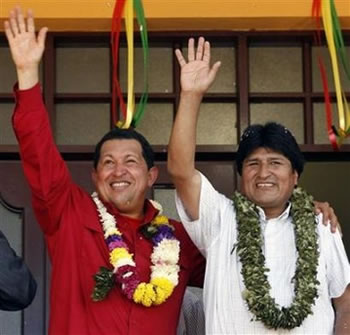
Venezuelan President Hugo Chavez pledged $1.5 billion in energy investments in impoverished Bolivia on Friday, receiving a hero's welcome from coca farmers who applauded his anti-U.S. message. Shouts of "Viva Venezuela!" rang out as Chavez, clad in an Andean-style red poncho and wool hat, spoke in Shinahota, a dusty town in the coca-growing Chapare region some 370 miles southeast of La Paz. Chavez's investment promises marked his latest effort to spread his oil largess -- Venezuela is the world's fifth largest crude exporter -- and boost his political influence across Latin America with moves that have included offering neighbors cut-rate oil deals and offers to buy their debt. Chavez addressed the crowd flanked by leftist allies Bolivian President Evo Morales and Cuban Vice President Carlos Lage and used the occasion to denounce President Bush, saying he had "given the green light to conspire against the Bolivian democracy." Bush said earlier this week he was concerned about "the erosion of democracy" in both Bolivia and Venezuela. Morales, a former coca farmer, has formed close ties with Chavez since being elected in December. "Bolivia has found its path because the Bolivian people have found the leader they were lacking," said Chavez, congratulating Morales on his May 1 decision to put Bolivia's energy industry in state hands. Venezuelan Energy Minister Rafael Ramirez said his country's state-owned oil company, PDVSA, was investing in exploration and production projects in Bolivia, South America's poorest country. Later in the city of La Paz, Ramirez signed deals with Bolivia's state-owned energy company YPFB that include building two gas-processing plants as well as exploring for new natural gas reserves. COCA A KEY ISSUE The choice of Bolivia's tropical Chapare region for the start of the Venezuelan president's visit was symbolic. Support for Morales is strong in Chapare, where for years he grew coca and led sometimes violent protests against U.S.-funded coca eradication programs. Coca is the main ingredient for cocaine but is also traditionally grown to make tea and for medicinal purposes. Venezuela plans to aid Bolivia in creating jobs by funding projects to produce organic tea, coffee, dairy and legal coca products. Chavez also donated computers to schools in Chapare. "Our three nations are talking about industrializing the coca leaf," Morales said, referring to Bolivia, Cuba and Venezuela. "We want to tell the whole world coca is not cocaine and we're going to industrialize it for the good of humanity." Bolivia is the world's third-largest cocaine producer after Colombia and Peru and Morales has vowed to seek legal uses for the plant as a way to fight cocaine trafficking and protect the livelihoods of peasant growers. Chavez is popular among the poor majority that forms Morales' support base, although some sectors of the Bolivian opposition are wary of his influence. Rightist opposition leader Jorge Quiroga told reporters on Thursday Morales was becoming Chavez's "puppet." Bolivia has South America's second-largest natural gas reserves after Venezuela and the government is keen to attract new investment in that sector, especially in exploration. Venezuelan aid to Bolivia has increased since Morales came to office but the Washington remains Bolivia's biggest aid donor. U.S. aid in Chapare is focused on eradicating coca and encouraging alternative crops such as bananas and pineapples.
